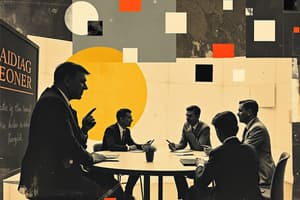Podcast
Questions and Answers
Laissez-faire Leadership style encourages micromanagement and strict control over team members.
Laissez-faire Leadership style encourages micromanagement and strict control over team members.
False (B)
Transactional Leadership style involves exchanging rewards and incentives for team members' efforts and performance.
Transactional Leadership style involves exchanging rewards and incentives for team members' efforts and performance.
True (A)
Transformational Leadership style discourages innovation and creativity among team members.
Transformational Leadership style discourages innovation and creativity among team members.
False (B)
Effective leaders always stick to one leadership style without adapting to the needs of their team.
Effective leaders always stick to one leadership style without adapting to the needs of their team.
Leadership in group and team processes is solely about delegating tasks and setting goals.
Leadership in group and team processes is solely about delegating tasks and setting goals.
Laissez-faire leaders are known for being highly involved in micromanaging their team members' tasks.
Laissez-faire leaders are known for being highly involved in micromanaging their team members' tasks.
Active listening involves ignoring the speaker and not engaging with their ideas.
Active listening involves ignoring the speaker and not engaging with their ideas.
Nonverbal communication, such as body language and tone, doesn't play a significant role in team dynamics and outcomes.
Nonverbal communication, such as body language and tone, doesn't play a significant role in team dynamics and outcomes.
Effective leaders in group settings encourage team members to handle conflicts destructively.
Effective leaders in group settings encourage team members to handle conflicts destructively.
Transformational leadership style focuses on restricting team members' development and potential growth.
Transformational leadership style focuses on restricting team members' development and potential growth.
Study Notes
Leadership Styles and Communication in Group and Team Processes
Leading a group or team isn't just about delegating tasks and setting goals—it's also about understanding the complex dynamics of communication and the various leadership styles that foster collaboration and success. This article will explore these topics and provide a framework for navigating the organizational landscape by delving into leadership styles and communication techniques used in group and team processes.
Leadership Styles
Effective leaders adapt their styles to the needs of their team and the organizational context. Three prominent leadership styles are transformational, transactional, and laissez-faire leadership:
-
Transformational Leadership: This style inspires and empowers team members, encouraging innovation and creativity. Transformational leaders motivate individuals to reach their full potential by providing guidance, mentorship, and a shared vision.
-
Transactional Leadership: This style focuses on exchanging rewards and incentives for team members' efforts and performance. Transactional leaders clearly communicate expectations and provide feedback to help team members meet their goals.
-
Laissez-faire Leadership: With this style, leaders give team members considerable freedom and autonomy, allowing them to make decisions and solve problems on their own. Laissez-faire leaders are more hands-off and provide guidance only when requested or when it's necessary to resolve conflicts.
Communication in Group and Team Processes
Effective communication is the cornerstone of successful group and team dynamics. When team members feel connected and heard, they're more likely to collaborate and engage with one another, which ultimately results in better outcomes.
Active Listening
Active listening involves giving full attention to the speaker and asking questions to clarify and validate their ideas. This approach helps team members feel respected and appreciated, and it also reduces misunderstandings and conflicts.
Nonverbal Communication
Nonverbal communication, such as body language, tone, and facial expressions, convey messages that often influence team dynamics and outcomes. Effective leaders are mindful of their nonverbal cues and strive to maintain positive energy and confidence when interacting with their teams.
Conflict Resolution
Conflicts are common in group and team settings, but they also present opportunities for growth and improvement. Effective leaders coach their teams to handle conflicts constructively, encouraging open and honest communication, and using negotiation and compromise to reach mutually beneficial solutions.
Quiz for Leadership Styles and Group and Team Communication
-
Which leadership style focuses on exchanging rewards and incentives for team members' efforts and performance? a. Transformational Leadership b. Transactional Leadership c. Laissez-faire Leadership d. Servant Leadership
-
What technique can help improve team communication, foster collaboration, and reduce misunderstandings? a. Active Listening b. Mind Reading c. Avoiding Conflict d. Negative Reinforcement
-
When facilitating a group discussion, which nonverbal communication technique is most effective in conveying openness and confidence? a. Crossed arms b. Slumped posture c. Leaning forward d. Avoiding eye contact
-
Which leadership style empowers and inspires team members to reach their full potential by providing guidance, mentorship, and a shared vision? a. Transactional Leadership b. Transformational Leadership c. Laissez-faire Leadership d. Bureaucratic Leadership
-
Effective communication in group and team settings includes: a. Withholding information b. Avoiding conflict c. Using sarcasm d. Being open and honest
Answers:
- b. Transactional Leadership
- a. Active Listening
- c. Leaning forward
- b. Transformational Leadership
- d. Being open and honest
Studying That Suits You
Use AI to generate personalized quizzes and flashcards to suit your learning preferences.
Description
Test your knowledge on leadership styles such as transformational, transactional, and laissez-faire, as well as effective communication techniques like active listening, nonverbal communication, and conflict resolution in group and team settings. Explore how to inspire and empower team members while fostering collaboration through clear communication and understanding of different leadership approaches.




